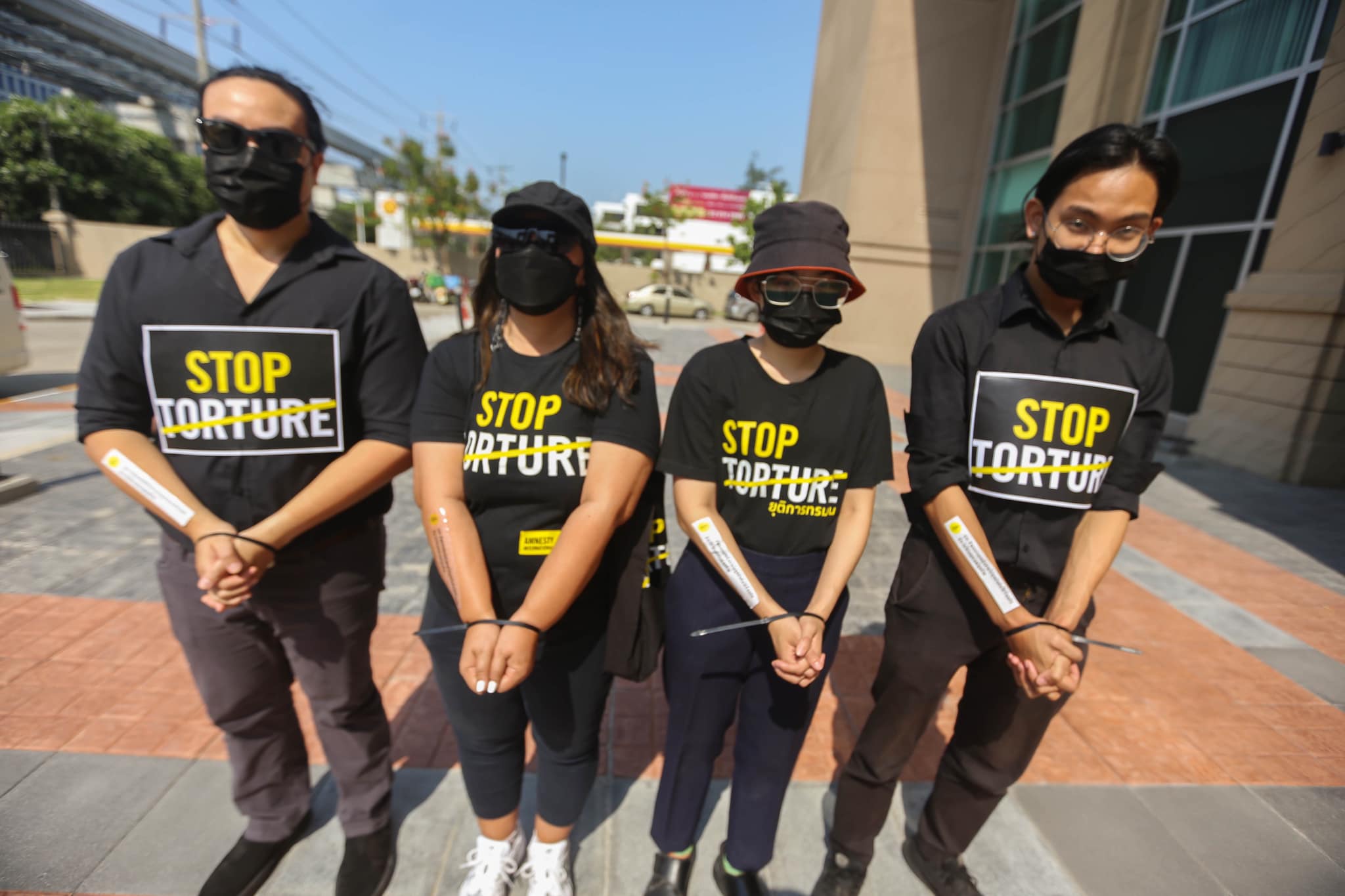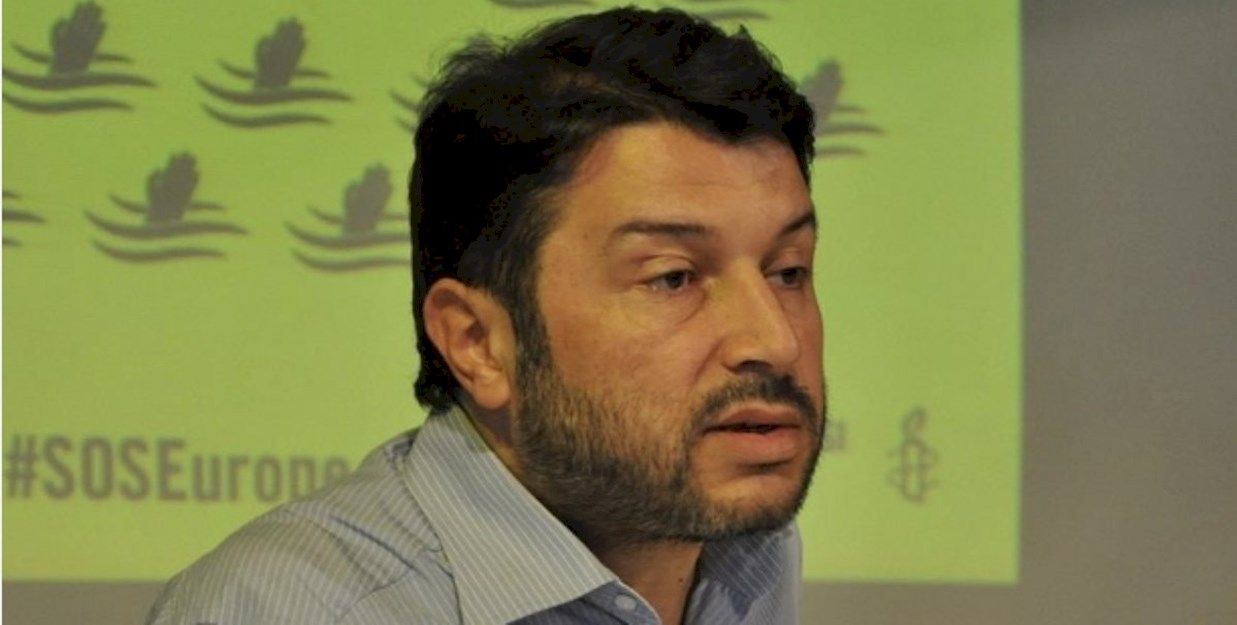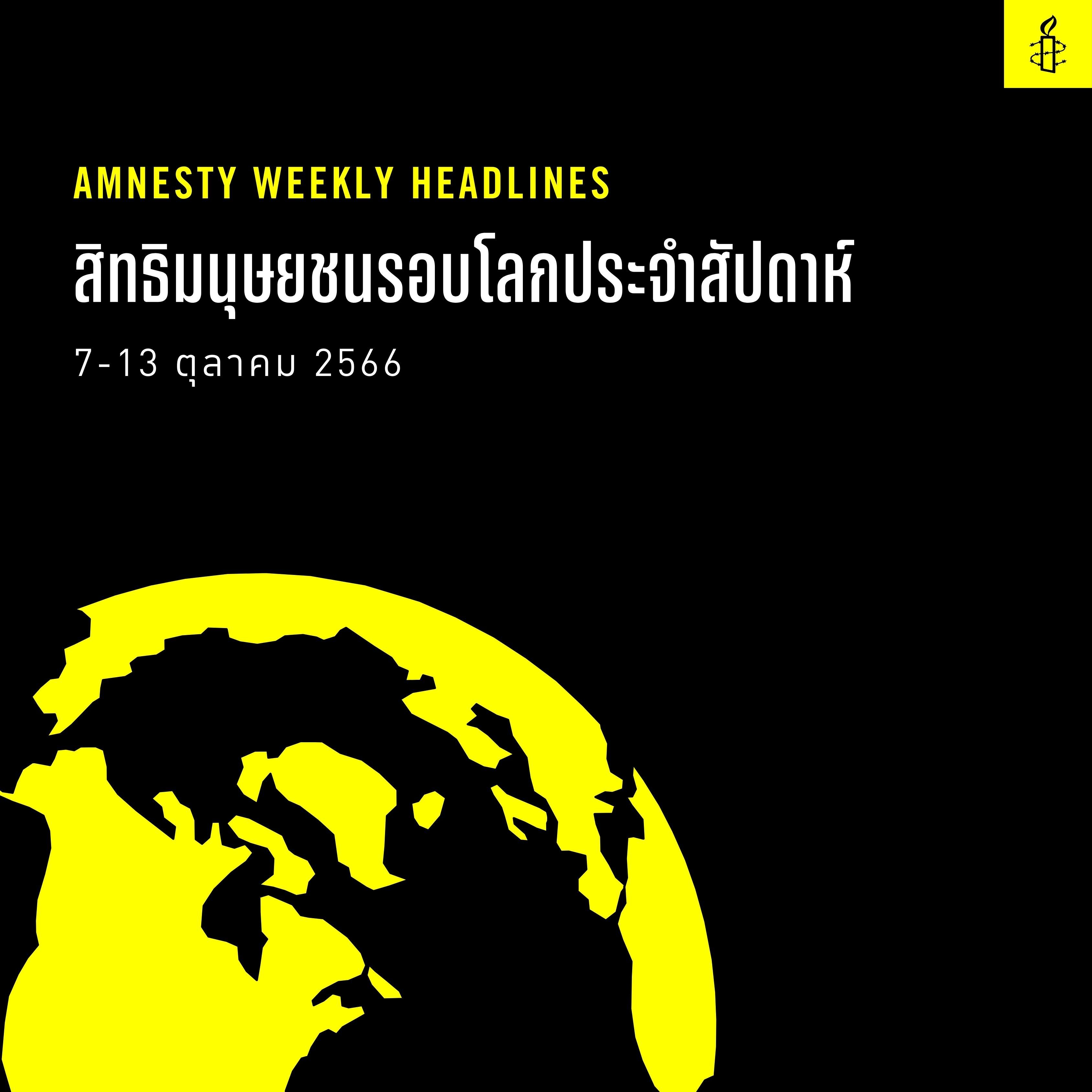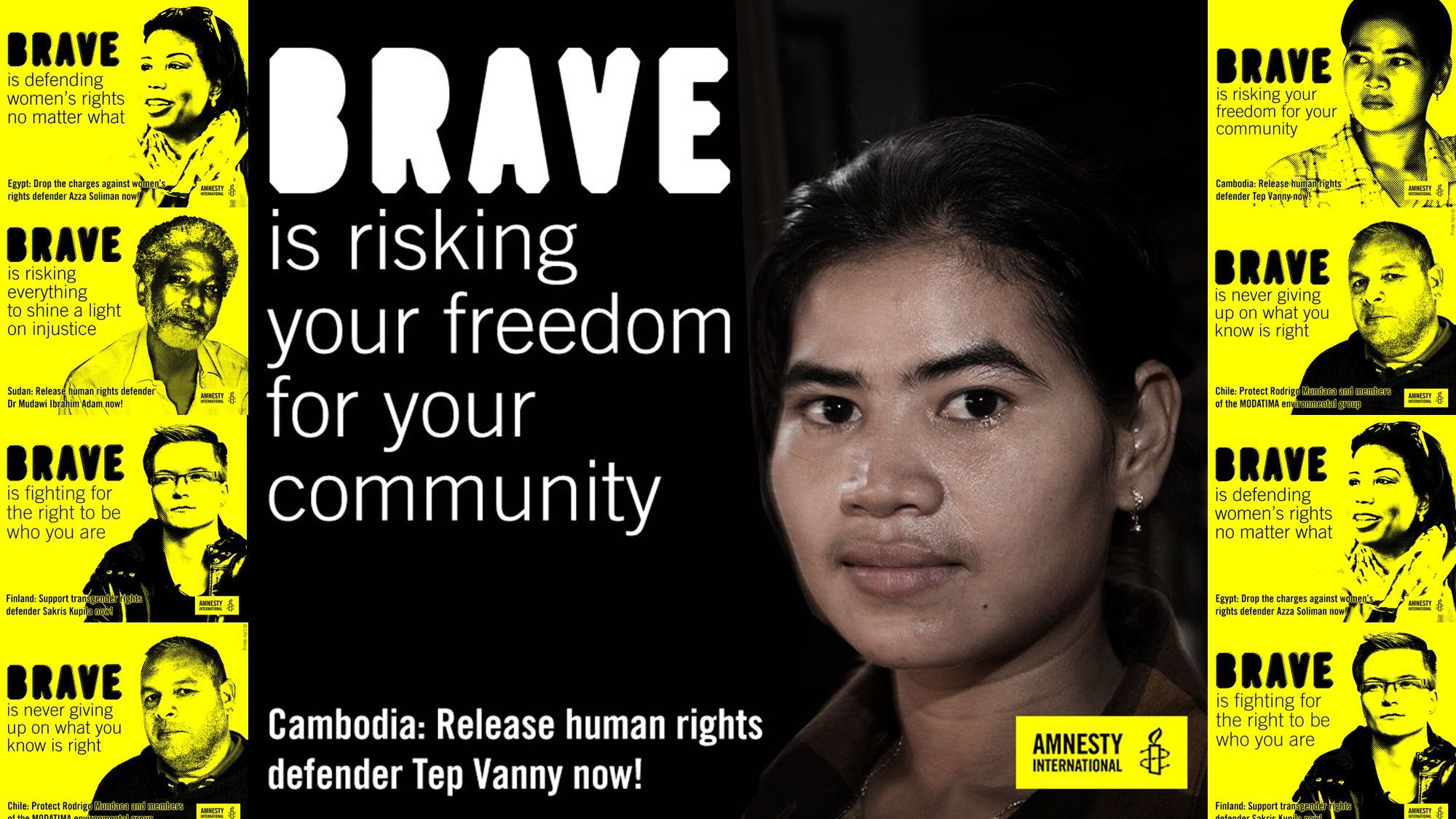Thailand: Law to address torture and enforced disappearance is an important step toward justice but its full enforcement is critical
22 February 2023
Amnesty International
Today, more than 15 years after Thailand became a State Party to the UN Convention Against Torture and Other Cruel, Inhuman or Degrading Treatment or Punishment (UNCAT), its long-delayed Act on Prevention and Suppression of Torture and Enforced Disappearance comes into effect. The International Commission of Jurists (ICJ) and Amnesty International welcome the law’s entry into force. Both organizations urge the authorities to follow this positive step with measures both to enforce the law and to make further international human rights commitments protecting against torture and ill-treatment and enforced disappearance.
The law is a result of the persistent efforts of victims and their families, NGOs, parliamentarians, and relevant authorities to create a legal framework to prevent the commission of these grave human rights violations, and to provide redress for survivors. While the law formally takes effect today, authorities have delayed enforcement of some of its key provisions until October.
The Act criminalizes torture, other ill-treatment, and enforced disappearance, and establishes legal and procedural safeguards against such practices. Its provisions also aim to ensure that victims and others can report torture and other ill-treatment and enforced disappearances without fear.
“Thailand finally has established a framework in its national law to tackle these appalling crimes, but now the Thai authorities must take real and practical measures to hold perpetrators accountable and provide for access to justice to victims and their families”, said Ian Seiderman, the ICJ’s Legal and Policy Director.
The organizations call for the reassessment of the need to delay the enforcement of some of its key provisions and immediate action toward the ratification, without any reservations, of the International Convention for the Protection of All Persons from Enforced Disappearance (ICPPED) and the Optional Protocol to the Convention against Torture (OP-CAT).
Allegations of torture, ill-treatment and enforced disappearances
The entry into force of the Act must be followed by domestic measures to combat torture, ill-treatment and enforced disappearances. These include ending the culture of impunity and ensuring justice, truth and reparation for victims of these crimes.
The National Human Rights Commission of Thailand and local Thai Civil Society Organizations, including in the southern border provinces, continue to receive complaints of alleged human rights violations at the hands of security forces, including torture, other ill-treatment and enforced disappearances.
Between 1980 and August 2022, the UN Working Group on Enforced or Involuntary Disappearances also recorded and transmitted 92 cases of alleged enforced disappearance to Thailand. Currently, 76 of these cases remain unresolved.
The number of cases in which these allegations have been investigated, let alone perpetrators prosecuted, remains low, as is the case concerning the access to effective remedies and reparations to victims. In a number of cases, alleged victims of torture or the families of those who died as a result of torture have received some monetary payments falling short of full reparation, but the perpetrators have not yet been brought to justice.
Postponement of key provisions of the Act
The ICJ and Amnesty International urge Thailand to ensure that the decision to delay the enforcement of articles 22 to 25 of the Act to 1 October 2023 be reviewed, and the time of enforcement be brought forward.
“The postponement of enforcement of some key provisions of the Act is troubling, and we urge the authorities to avoid any further delay,” added Seiderman. “In their absence, the Act will fall short of becoming a fully effective legal instrument and may not create the actual changes on the ground.”
On 14 February 2023, the Thai Cabinet approved the postponement of enforcement of articles 22 to 25 of the Act through the apparently inappropriate use of an Emergency Decree. The order cited as a reason for the delay the need for more time to procure equipment and a shortage of skills. The postponed articles require public officials to record by audio and video all stages of the arrest and detention process. In addition, they must record and disclose, upon request, information about detainees.
According to section 172 of the 2017 Constitution, an Emergency Decree shall only be enacted for the purpose of “maintaining national or public safety or national economic security, or averting public calamity” when there was an “emergency of necessity and urgency which is unavoidable”.
The Decree was published in the government gazette on 19 February 2023. It cited that the invocation of the Decree was an emergency of necessity and urgency because the above-noted shortage of equipment and skills may “directly affect people’s lives and their physical bodies”, “public safety”, “be challenged in the process of prosecuting the accused, thus, made the arrest illegal”, and “the authorities with no adequate resources might be subject to criminal and disciplinary liabilities”.
The Decree must later be submitted to the subsequent sitting of the National Assembly for its consideration. However, the current parliamentary session ends on 28 February 2023 and the consideration and reaffirmation of the Emergency Decree is likely to take place only after the general election scheduled on 7 May 2023.
Existing shortcomings
While the law is a step forward, there are shortcomings that need to be addressed to guarantee its full compliance with international human rights laws and standards.
“The earlier draft law had numerous problematic provisions. Some shortcomings that we have identified have been addressed in the adopted Act,” said Carolyn Horn, Amnesty International’s interim Law and Policy Programme Director. “However, the legislation does not fully contain what is required under human rights treaties to which Thailand is a party, including the UNCAT and the International Covenant on Civil and Political Rights (ICCPR).”
The ICJ and Amnesty International have repeatedly indicated that aspects of the bill fall short of Thailand’s international legal obligations.
The current Bill continues to contain provisions that are inconsistent with international law and standards. Key concerns include:
- Definitions of the crimes of torture and enforced disappearance are incomplete or otherwise discordant with international law, and ‘disappearance’ committed by non-state actors, as provided in Article 3 of the ICPPED, is not defined;
- The removal of the clause which would ensure that amnesties cannot be granted for these crimes;
- The lack of representation of victims of torture and enforced disappearance in the composition of the established Committee on the Prevention and Suppression of Torture and Enforced Disappearance and the removal of the inspection of places of detention from the Committee’s duties;
- The removal of the provision on the inadmissibility of statements and other information obtained by torture, ill-treatment and enforced disappearances as evidence in legal proceedings; and
- The absence of provisions containing prescriptions for torture and enforced disappearance crimes that are fully compliant with UNCAT and ICPPED.
The ICJ and Amnesty International’s further analysis of the existing shortcomings of the Bill can be found here in English and Thai.
Addressing other root causes of torture, ill-treatment and enforced disappearances
Other factors that may facilitate and drive practices of torture, including the laws that allow the practice of incommunicado detention which may facilitate the commission of acts of torture and ill-treatment, must also be addressed.
“The Thai government has yet to ensure in law, policy and practice that individuals are not held in conditions that increase the risk of torture, ill-treatment and enforced disappearance,” added Horn. “In particular, Thailand should take steps to amend laws allowing individuals to be held in unofficial places of detention, without judicial oversight, which create conditions that facilitate torture and other ill-treatment.”
In southern border provinces, there are currently three special security laws in force: the Martial Law Act B.E. 2457 (1914), the Decree on Public Administration in Emergency Situations B.E. 2548 (2005), and the Internal Security Act B.E. 2551 (2008). Martial Law and the Emergency Decree provide for enlarged executive powers of administrative detention without adequate judicial supervision. When the authorities exercise these powers, they are not required to bring detainees before a court at any stage of their detention.
Ratification of international treaties
Thai authorities should avoid further delays in ratifying the ICPPED and the OP-CAT.
“The organizations urge Thailand to carry out its stated commitment to ratify the ICPPED without any reservation and without any further delay and move ahead with its commitment to ratify the OP-CAT,” added Horn.
Thailand is a State Party to the ICCPR and the UNCAT. In January 2012, Thailand signed the ICPPED, but in the 11 years since that signing has failed to ratify the Convention.
On 10 March 2017, Thailand’s National Legislative Assembly approved the ratification of the ICPPED. However, the Thai Government has not yet set a clear time frame for depositing the treaty with the United Nations Secretary-General as required, citing that it was undertaking a domestic preparation process in order to finalize ratification of the ICPPED.
On 12 November 2021, during its third Universal Periodic Review cycle, Thailand also accepted recommendations regarding the ratification of the ICPPED and the OP-CAT by the UN Human Rights Council.
The OP-CAT obligates authorities to establish a National Preventive Mechanism – an independent expert body authorized to visit places of detention, including by carrying out unannounced visits – as well as to allow such visits by an international expert body. Such independent scrutiny is critical to prevent torture and other ill-treatment, including through implementing detailed recommendations based on visits.
The statement in English can be downloaded here.
The statement in Thai can be downloaded here.




